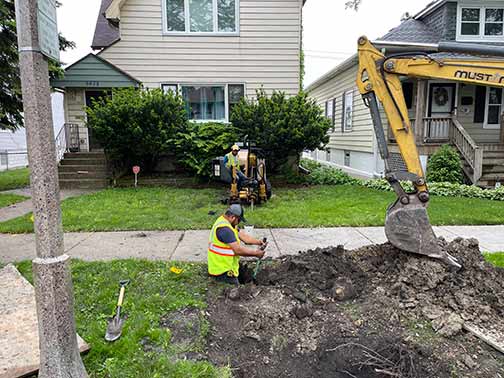
When it comes to real estate transactions, various aspects need to be considered, and one important factor is the responsibility for paying for sewer line repairs. Sewer line issues can be costly and disruptive, so understanding who is accountable for these repairs is crucial for both buyers and sellers. Here we will explore the different scenarios and parties involved in paying for sewer line repairs in real estate transactions.
Understanding the Sewer System
Before delving into who is responsible for sewer line repairs, it’s essential to have a basic understanding of the sewer system. A sewer system collects and transports wastewater from individual properties to a treatment facility. The system consists of pipes, known as sewer lines, which can range from small residential pipelines to large municipal networks.
Over time, due to various factors such as age, tree root intrusion, or ground shifting, sewer lines can develop issues that require repairs. These issues may include blockages, leaks, or even complete line collapses. Identifying and rectifying these problems is vital to maintain the functionality and hygiene of the sewer system.
Responsibility for Sewer Line Repairs
The responsibility for sewer line repairs in real estate transactions can vary depending on several factors, including local regulations, contractual agreements, and the condition of the sewer system. Let’s consider the different scenarios:
Buyer’s Responsibility
In some cases, the buyer assumes the responsibility for sewer line repairs. This typically occurs when the buyer conducts a thorough inspection of the property and identifies existing sewer line issues before finalizing the transaction. The buyer may negotiate a reduced purchase price or request that the seller completes the necessary repairs before proceeding.
If the buyer chooses to proceed with the transaction despite being aware of the sewer line issues, they generally become responsible for any repairs or replacements needed after the purchase. Therefore, it is crucial for buyers to conduct a comprehensive inspection of the property, including the sewer system via a sewer camera inspection, before making a final decision.
Seller’s Responsibility
In other instances, the seller might be responsible for sewer line repairs. This typically occurs when the seller is aware of existing sewer line issues but fails to disclose them to the buyer during the negotiation and purchasing process. The failure to disclose can lead to legal ramifications, and the seller may be obligated to rectify the problems at their own expense.
Some jurisdictions impose specific disclosure requirements on sellers, necessitating them to provide comprehensive information about the condition of the property, including the sewer system. Failing to comply with these requirements can result in legal penalties and financial liabilities for the seller.
Shared Responsibility
In certain scenarios, the responsibility for sewer line repairs may be shared between the buyer and the seller. This shared responsibility can arise when the sewer lines require immediate attention, but the transaction is already in progress or near completion.
Under these circumstances, the buyer and seller may negotiate a shared cost arrangement, splitting the expenses for sewer line repairs. This can be documented through a contractual agreement, outlining the specific responsibilities and financial obligations of each party. Shared responsibility allows for a more equitable resolution, ensuring that both the buyer and seller contribute to the necessary repairs.

It is always advisable for buyers and sellers to seek professional advice from real estate agents, attorneys, or inspectors when dealing with sewer line repairs in real estate transactions.
Homeowner’s Insurance
In some cases, homeowners’ insurance policies can provide coverage for sewer line repairs. However, it is essential to carefully review the insurance policy terms and conditions to determine if sewer line repairs are included in the coverage. Many policies have specific exclusions or limitations for sewer line repairs, so it’s crucial to have a clear understanding of the policy before relying on it for potential repairs.
Additional Considerations
When addressing sewer line repairs in real estate transactions, several additional considerations come into play:
Inspection Contingency
Buyers can protect themselves by including an inspection contingency in the purchase contract. This contingency allows the buyer to hire a professional inspector to thoroughly assess the property, including the sewer system, before finalizing the transaction. If significant issues are discovered during the inspection, the buyer may have the option to renegotiate the terms or withdraw from the sale.
Disclosure Statements
Sellers are typically required to provide disclosure statements that detail any known issues or defects with the property. These statements often include questions specifically related to the condition of the sewer system. Buyers should carefully review these disclosures and evaluate the potential risks associated with any disclosed sewer line issues.
Professional Advice
It is always advisable for buyers and sellers to seek professional advice from real estate agents, attorneys, or inspectors when dealing with sewer line repairs in real estate transactions. These professionals can provide guidance, review contracts, and ensure compliance with local regulations, ultimately protecting the interests of both parties involved.
When it comes to sewer line repairs in real estate transactions, understanding the responsibilities of buyers and sellers is essential. Whether the buyer assumes the responsibility, the seller is held accountable, or both parties share the cost, having a clear understanding of the sewer system’s condition and seeking professional advice can help navigate potential issues smoothly. By addressing sewer line repairs appropriately, both buyers and sellers can ensure a successful and fair real estate transaction.